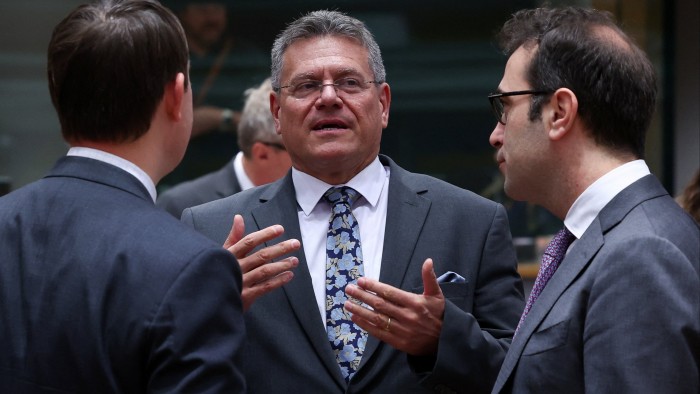Unlock the Editor’s Digest for free
Roula Khalaf, Editor of the FT, selects her favourite stories in this weekly newsletter.
Trade between the EU and US will be “almost impossible” if Donald Trump imposes the 30 per cent tariffs he is threatening, the EU’s trade commissioner has said.
“If you’re talking about 30 per cent or 30 per cent plus, there will be a huge impact on trade. It will be almost impossible to continue trading as we are used to in a transatlantic relationship,” Maroš Šefčovič said in response to the US president’s warning that he would impose duties at that level on the EU from August 1.
“Transatlantic supply chains would be heavily affected on both sides of the Atlantic. Show me one industry leader who is happy about this tariff policy,” he said.
Šefčovič will brief EU trade ministers at a meeting today on the state of talks with the US as the bloc considers retaliatory measures.
He told reporters ahead of the meeting: “The feeling on our side was that we are very close to an agreement.” But Trump confounded Brussels — and some EU officials say his own negotiators — with his letter containing the new tariff threat posted to his Truth Social platform on Saturday.
Trump’s so-called reciprocal tariffs were originally set at 20 per cent in April then dropped to 10 per cent to allow time for negotiations, before the latest 30 per cent threat.
Šefčovič said he would talk to US commerce secretary Howard Lutnick this afternoon in a push for a deal.
But diplomats also expect him to put forward to EU member states a new package of possible retaliatory tariffs against the US. They will cover about €72bn of annual US imports, two diplomats said, after governments lobbied for some exemptions from an original €95bn list.
The commission is delaying a separate plan to hit €21bn of annual US imports — drawn up in response to Trump’s separate duties on imports of steel, aluminium and cars from the EU — until mid-August to allow time for talks.
Šefčovič said the imposition of 30 per cent reciprocal tariffs would mean the EU had nothing to lose if Trump escalated with even higher numbers in response.
“30 per cent or anything above 30 per cent — any additional counter-reaction from the United States — it has more or less the same effect. So practically, it prohibits trade,” he said.
Larger member states have been reluctant to strike back at the US, for fear of provoking Trump.
Friedrich Merz, the German chancellor, and Giorgia Meloni, the Italian premier, both talked up the prospects of a negotiated deal and warned against a trade war at the weekend.
Lars Løkke Rasmussen, the foreign minister of Denmark, which holds the rotating presidency of the EU, said the bloc was considering measures against services. It also should consider using its most powerful tool, the anti-coercion instrument (ACI), dubbed a “trade bazooka”, he said. The ACI allows the EU’s executive arm to impose restrictions on trade in services if it determines that a country is using tariffs on goods to force changes in policy.
“If you want peace, you have to prepare for war,” Rasmussen said.
But Ursula von der Leyen, European Commission president, said at the weekend it was not yet time to use the ACI.
Šefčovič also said on Monday that Brussels was consulting other “like-minded” trading partners about a co-ordinated response, without naming any countries.
Trump has levied 10 per cent “reciprocal tariffs” on most of the world, along with 50 per cent national security tariffs on steel and aluminium and 25 per cent on vehicles and parts. So far, only the UK, Vietnam and China have agreed partial deals with Washington, with the latter two still locked into high tariffs.
#warns #Trumps #tariffs #eliminate #transatlantic #trade


